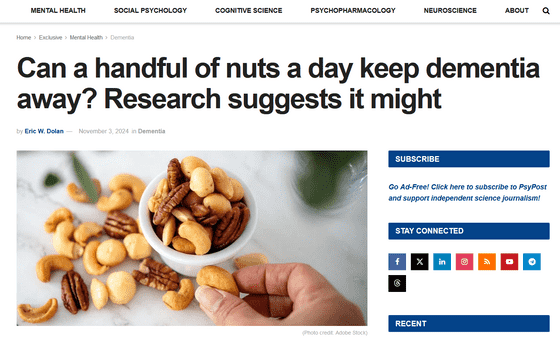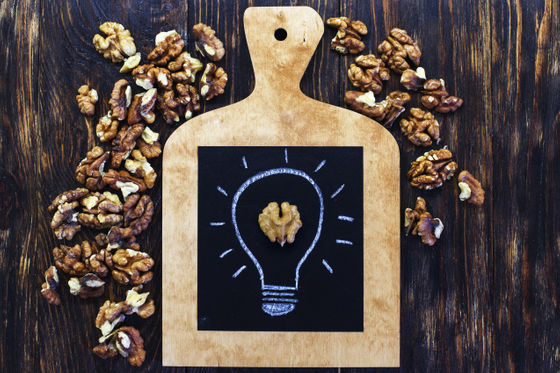Study reveals that people who eat a handful of nuts every day have a lower risk of dementia

Although the causes and mechanisms of dementia have not been fully elucidated, past
Nut consumption is associated with a lower risk of all-cause dementia in adults: a community-based cohort study from the UK Biobank | GeroScience
https://link.springer.com/article/10.1007/s11357-024-01365-z
Eating Nuts Linked to Lower Risk of Dementia, Study Finds : ScienceAlert
https://www.sciencealert.com/eating-nuts-linked-to-lower-risk-of-dementia-study-finds
Eating a handful of nuts a day could lower risk of developing dementia, study finds | Daily Mail Online
https://www.dailymail.co.uk/health/article-13953703/handful-nuts-lower-risk-developing-dementia-study.html
Can a handful of nuts a day keep dementia away? Research suggests it might
https://www.psypost.org/can-a-handful-of-nuts-a-day-keep-dementia-away-research-suggests-it-might/

A research team from the University of Castilla-La Mancha in Spain and the Institute of Public Health of the University of Porto in Portugal looked at the dietary habits and incidence of dementia among participants of UK Biobank, a large-scale study being conducted in the UK.
The mean age of the 50,386 participants analyzed was 56.5 years, 49.3% were women, and over an average follow-up period of 7.1 years, participants had 1,422 cases of all-cause dementia, or 2.8%, of dementia of any type, including Alzheimer's disease.
The study found that people who reported eating 0 to 3 handfuls (around 30g) of nuts daily had a 12% lower risk of developing dementia compared to people who did not eat nuts. This result was significant even after controlling for factors such as age, sex, BMI, education, and lifestyle habits.

In addition, detailed stratified analysis of participants into groups revealed that the two factors associated with the greatest protective effect were 'nut intake of up to 30 g per day' and 'eating unsalted nuts.'
In other words, to maximize the dementia prevention effect of nuts, it seems best to eat lightly seasoned nuts in a moderate amount that fits lightly in the palm of your hand. Whether the nuts had their shells or skins on, or whether they were roasted, did not affect the results.
It is important to note that this effect was seen in people who were not obese, had normal sleep times, did not smoke, and did not drink alcohol daily. Given that research has shown that consuming only half a can of beer a day can cause brain atrophy, the preventive effect of eating nuts as a snack with an evening drink may be limited.

'Future long-term follow-up studies, including both observational studies and clinical trials, will be needed to evaluate the effectiveness of nut consumption as a dementia prevention strategy in adults,' the researchers wrote in their paper.
Because this was an observational study, it did not prove a causal relationship, such as 'eating nuts prevents dementia.' However, other research has shown that nuts, which are rich in nutrients with anti-inflammatory and antioxidant properties, are a good source of brain health.
For example, a study published in 2023 compared 28 healthy subjects with an average age of 65 years with a daily intake of 60g of unsalted mixed nuts, including walnuts, pistachios, cashews, and hazelnuts, for 16 weeks. The results showed that consuming nuts improved cerebral blood flow and memory.

Another study involving 61 subjects with an average age of 65 and a BMI of around 31, which is considered overweight, showed that consuming 56 to 84 grams of high-oleic acid peanuts per day for 12 weeks improved cerebrovascular and cognitive function.
Bridget Benelaam of the British Nutrition Foundation told the Daily Mail: 'Nuts are highly nutritious, containing fat, protein, fibre and a range of other micronutrients. Given that they're also linked to a reduced risk of heart disease, cancer and type 2 diabetes, they're a great food to include in a healthy diet - but it's important not to eat too many of them as they're high in calories.'
Related Posts:







